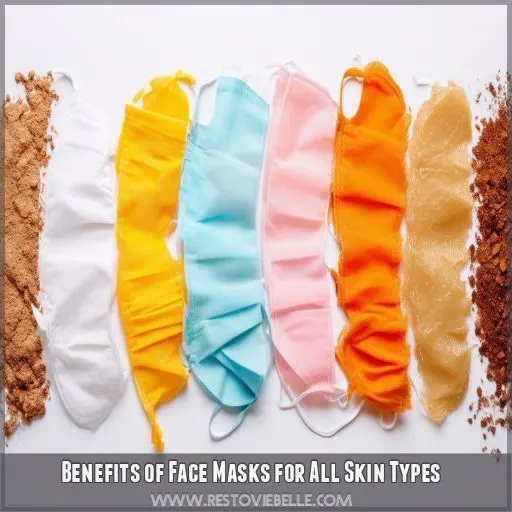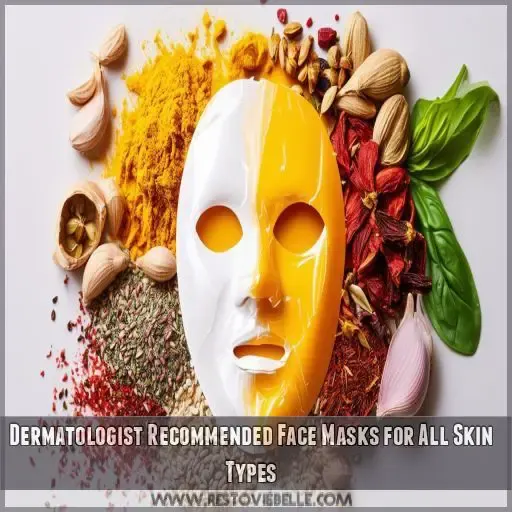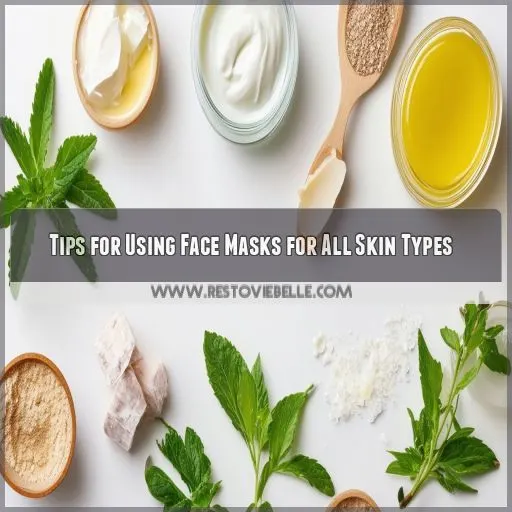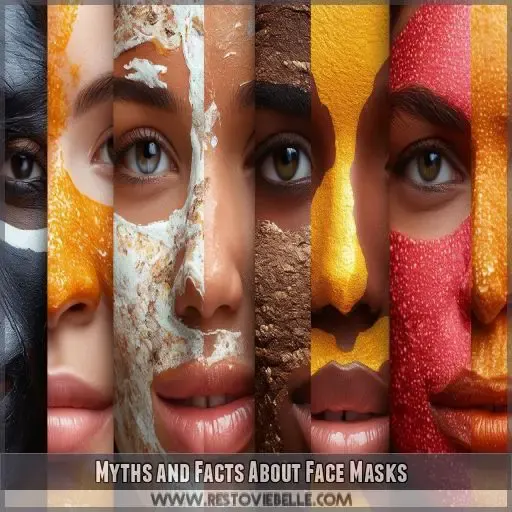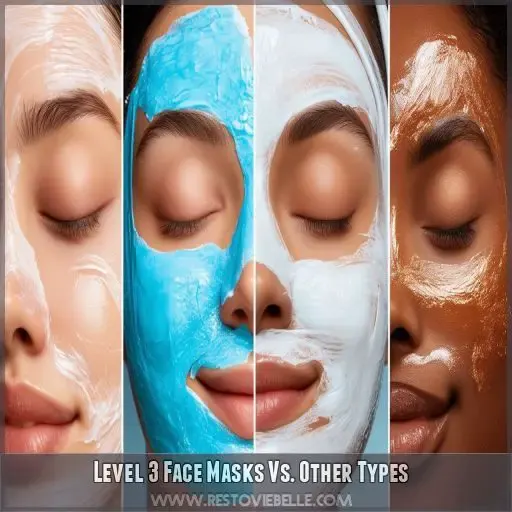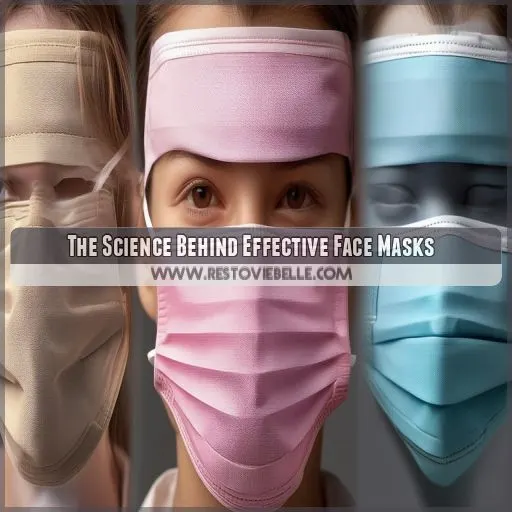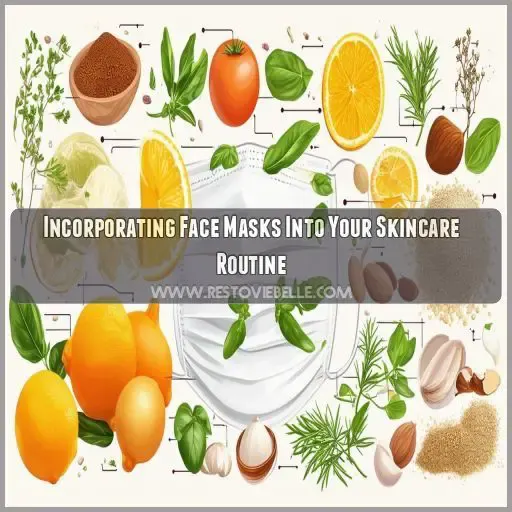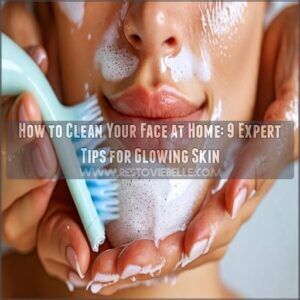This site is supported by our readers. We may earn a commission, at no cost to you, if you purchase through links.
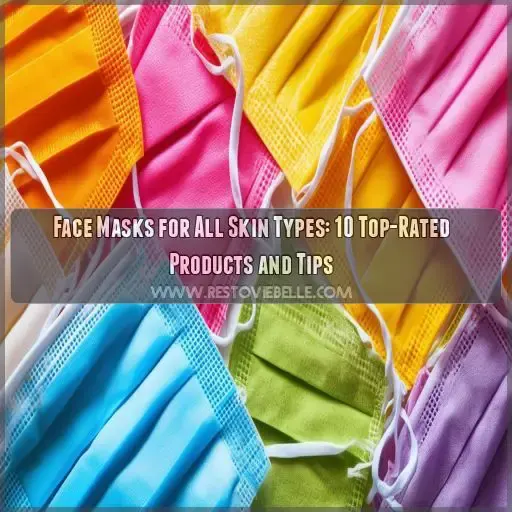 Your skin is unique.
Your skin is unique.
This doesn’t mean you can’t find a face mask suited to your specific needs, though.
From hydrating masks to calming formulas, there is a diverse range of options available.
Discover top-rated products and tips to unlock the secret to healthy, glowing skin.
Table Of Contents
- Key Takeaways
- Top 6 Best Face Masks for All Skin Types
- Benefits of Face Masks for All Skin Types
- Dermatologist Recommended Face Masks for All Skin Types
- Tips for Using Face Masks for All Skin Types
- Myths and Facts About Face Masks
- Level 3 Face Masks Vs. Other Types
- The Science Behind Effective Face Masks
- Incorporating Face Masks Into Your Skincare Routine
- Frequently Asked Questions (FAQs)
- Which mask is best for all skin types?
- What face masks are actually good for your skin?
- Do dermatologists recommend face masks?
- What are Level 3 face masks?
- How often should I use a face mask?
- Are there natural alternatives to store-bought face masks?
- How long should I leave a face mask on for?
- Are there any side effects to using face masks?
- What ingredients should I avoid in face masks?
- Conclusion
Key Takeaways
- Face masks are a magic wand for your skin, offering hydration, cleansing and exfoliation for that radiant glow.
- There is no ‘one-size-fits-all’ when it comes to face masks. Choose one that suits your skin’s needs, like a tailored suit.
- Consistency is vital! Indulge in face masks regularly, giving your skin a spa-like experience each week to maintain its health and happiness.
- Be attentive to your skin’s reactions and avoid overdoing it. Treat your skin as you would a delicate flower, and it will flourish with health.
Top 6 Best Face Masks for All Skin Types
Let’s explore six top-rated face masks that work wonders for all skin types. From hydrating masks like Aveeno’s Pomegranate to the detoxifying Caudalie Instant Detox Clay Mask, these options cater to various skincare needs and are backed by dermatologists for their effectiveness.
1. Aveeno Pomegranate Hydrating Face Mask
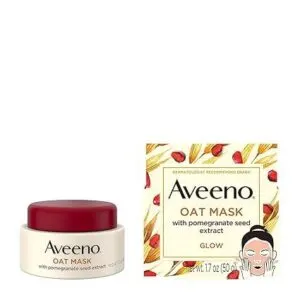
The Aveeno Pomegranate Hydrating Face Mask is a top choice for nourishing and hydrating your skin.
Its formula includes prebiotic oat, pomegranate seed extract, and kiwi water, which enhance your skin’s radiance and hydration.
The mask has a rich, velvety texture. It is gentle enough for frequent use, up to 2-3 times per week.
It is also free of parabens and phthalates, allergy-tested, and non-comedogenic, making it suitable for those with sensitive skin.
Best For: Those seeking a nourishing and hydrating face mask with natural ingredients.
- Prebiotic oat, pomegranate seed extract, and kiwi water nourish and hydrate skin
- Boosts glow and hydrates skin
- Rich, velvety texture
- Not suitable for those with extremely dry skin
- May not be effective for treating specific skin concerns (e.g., acne, wrinkles)
- May leave a slightly oily residue on some skin types
2. Origins Charcoal Mask
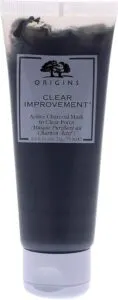
If you’re seeking a face mask that suits all skin types, consider the Origins Charcoal Mask.
This unscented, paste-form mask penetrates deep into your pores to purge impurities and debris, leaving your skin refreshed and clear.
It’s especially beneficial for those with sensitive skin, as it’s formulated with care to avoid irritation.
For ideal results, use it every other week to maintain a matte finish and a healthy complexion.
Best For: Those with sensitive skin seeking a clarifying deep-cleanse.
- Deeply cleanses and removes impurities
- Suitable for sensitive skin
- Leaves a matte finish
- Can only be used every other week
- Unscented, which may not be preferred by some
- May not be suitable for all skin types
3. Skyn Iceland Eye Gels
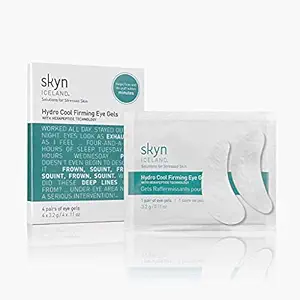
Skyn Iceland Eye Gels are cooling under-eye gel patches that deliver impressive results in just 10 minutes.
They are designed to firm, tone, and de-puff the delicate under-eye area, making you look more awake.
These gel patches are comfortable to wear and are packed with concentrated soothing ingredients:
- Extensin proteins for firming and toning.
- Hexapeptide to reduce fine lines and wrinkles.
Best For: Those seeking a quick and effective way to firm, tone, and de-puff the under-eye area.
- Delivers noticeable results in just 10 minutes
- Comfortable to wear and easy to apply and remove
- Formulated with soothing and nourishing ingredients
- May cause irritation in some individuals
- Not effective for everyone
- Pricey
4. Burts Bees Overnight Lip Treatment
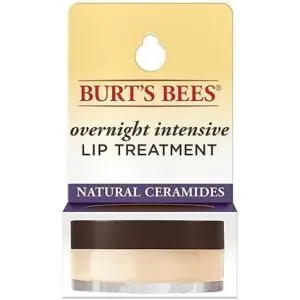
Regarding lip care, Burt’s Bees Overnight Intensive Lip Treatment is a remarkable product. This dermatologist-recommended natural skincare brand provides an intensive overnight lip mask that hydrates and nourishes chapped lips. The formula, infused with vitamin E and ceramides, moisturizes and conditions your lips, reducing the appearance of fine lines and supporting their natural moisture barrier. With consistent use every other night, you’ll wake up to softer, smoother lips that feel healthy and look plump.
The product is proudly made in the USA and comes in a 0.25 oz recyclable jar. It’s 100% natural in origin and free from parabens, phthalates, petrolatum, and SLS. So you can trust that what you’re putting on your lips is safe and effective. Plus, with Leaping Bunny Certification, you can be sure that Burt’s Bees never tests on animals.
Best For: Overnight hydration and lip nourishment for dry, chapped lips.
- Hydrates lips for up to 8 hours
- Moisturizes, conditions, and reduces the appearance of fine lines
- 100% natural origin and free from parabens, phthalates, petrolatum, and SLS
- May melt in transit during warm weather
- Requires consistent use for best results
- May not be suitable for very sensitive lips
5. Aztec Secret Indian Healing Clay

Aztec Secret Indian Healing Clay is a cult favorite for deep cleansing and skin rejuvenation.
This 100% natural calcium bentonite clay is shrink-wrapped with a security sticker to guarantee authenticity.
It is versatile and can be used as a facial, body wrap, clay bath, foot soak, hair mask, or even a chilled knee pack for insect bites.
You’ll notice reduced redness and drying after 30 minutes, and the tightening sensation during drying confirms its cleansing properties.
Aztec Secret Indian Healing Clay is a cost-effective and multi-purpose product that is great for all skin types.
Best For: Those looking for a deep cleansing and rejuvenating natural clay product.
- 100% natural calcium bentonite clay
- Versatile for various uses including facials, body wraps, and hair masks
- Reduces redness and drying after 30 minutes
- Dermatologist recommended forearm patch test before facial use
- Tightening sensation during drying indicates cleansing properties
- Not for internal use
6. Caudalie Instant Detox Clay Mask
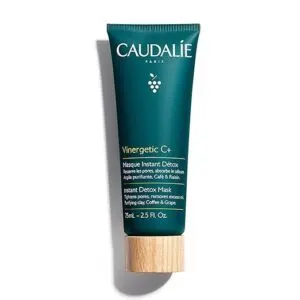
Caudalie’s Instant Detox Clay Mask is a powerful, purifying treatment designed for city-dwelling skin.
This 99% natural formula deep cleanses pores, removing excess sebum and impurities, to visibly refine skin texture and minimize pores.
Your complexion will be radiant and even, with a fresh and clean feel. A little of this mask goes a long way, and it’s free of harsh ingredients like phthalates, mineral oil, and parabens.
At 2.5 ounces, this mask is an excellent choice for those seeking a potent detox treatment.
Best For: City dwellers with stressed skin that needs deep cleansing and pore refining.
- Visibly refines skin texture and tightens pores
- Deeply cleanses pores and removes excess sebum
- Radiant and even complexion
- Can be drying for some skin types
- Pricey
- Strong scent
Benefits of Face Masks for All Skin Types
Face masks provide significant benefits for all skin types, including hydration, cleansing, and exfoliation. They help boost moisture levels, remove impurities, and gently slough off dead skin cells, promoting a healthier complexion.
Hydration
Face masks are a fantastic way to boost your skin’s hydration.
Whether you have dry, oily, or combination skin, there is a mask tailored to your needs, packed with hydrating ingredients to nourish and moisturize.
Overnight masks are perfect for dry skin, providing long-lasting hydration while you sleep.
The Aveeno Oat Face Mask, for example, is a great option for those seeking to deep-cleanse their pores while also benefiting from a boost of moisture.
Cleansing
Face masks are a great way to give your skin a deep cleanse. They can help to remove excess oil, refine pores, and reduce shine, especially if you have oily or combination skin.
Here are some key benefits of using face masks for deep cleansing:
- Oil Control
- Pore Refining
- Shine Reduction
- acne Prevention
The right face mask can provide a targeted treatment to address specific skin concerns, leaving your skin feeling refreshed and rejuvenated.
Exfoliation
Exfoliation is a key benefit of face masks, sloughing off dried-out skin cells to reveal a fresh, glowing complexion.
Exfoliating masks come in two main types: physical exfoliants, which scrub away dead skin, and chemical exfoliants, which use ingredients like alpha-hydroxy acids or salicylic acid to gently dissolve dead skin cells.
The frequency of exfoliation depends on several factors: your skin type and the specific exfoliation technique and ingredients used. For instance, physical exfoliants may be too harsh for acne-prone skin; a gentle chemical exfoliant, used once a week, could be a better option.
Dermatologist Recommended Face Masks for All Skin Types
Dermatologists recommend using a variety of face masks to address different skin concerns. Hydrating masks, calming masks, and clarifying masks can all play a valuable role in maintaining healthy, balanced skin.
Hydrating Masks
When it comes to providing your skin with a hydrating boost, seek masks specifically engineered to retain moisture. These masks are frequently abundant in components like hyaluronic acid, watermelon, and natural oils, which are renowned for their ability to attract and retain water, leaving your skin feeling supple and radiant.
One of the advantages of utilizing hydrating masks is their capacity to substantially enhance your skin’s hydration levels. For instance, the Julep Night Shift Deep Sleep Facial Mask, an overnight mask infused with shea butter and natural oils, has been shown to increase skin hydration by 43%.
Calming Masks
Calming masks are perfect for when your skin needs a moment of relaxation and relief. These masks are like a spa day for your complexion, offering soothing properties and anti-inflammatory benefits that work wonders for sensitive skin.
Here are some key considerations when choosing calming masks:
- Calming ingredients: Look for ingredients known for their calming and soothing effects, such as aloe vera, chamomile, and green tea.
- Sensitive skin solutions: If you have sensitive skin, opt for calming masks designed for your skin type. Avoid harsh chemicals and choose formulas with gentle, natural ingredients.
- Hydration and nourishment: Calming masks often provide a boost of hydration, which is key to maintaining healthy skin.
- Niacinamide serums: Using a niacinamide serum before applying a calming mask can enhance its benefits, as niacinamide is known to reduce inflammation and promote healthy skin.
Clarifying Masks
Clarifying masks are ideal for when your skin needs a deep clean. These masks are formulated with clarifying ingredients to help absorb excess oil, tighten pores, and fight acne. Look for detoxifying properties in masks with acne-fighting, pore-smoothing, and pore-clearing abilities. Charcoal and clay masks are particularly effective for blackhead removal.
Tips for Using Face Masks for All Skin Types
When using face masks, you should determine the ideal frequency based on your skin type and always perform a patch test to avoid adverse reactions. Proper application techniques, such as spreading an even layer and following instructions, guarantee effective results and safety for your skin.
Frequency of Use
The frequency of face mask use depends on your skin type and the type of mask you’re using.
- Generally, deep-cleansing or exfoliating masks should be used sparingly, about once a week, to avoid over-drying or irritating the skin.
- Hydrating and nourishing masks can be used more frequently, even daily, to boost and maintain moisture levels.
- Always follow the instructions on your chosen mask for the appropriate frequency and duration of application.
Patch Testing
Patch testing is an essential step when trying new face masks, especially for those with sensitive skin.
It is a simple way to guarantee a product will not cause irritation or allergies.
Before applying a mask to your entire face, do a patch test by applying a small amount of the product to a discrete area, such as your jawline or behind your ear.
Leave it on for the recommended time and then rinse it off.
If you experience any redness, itching, or discomfort, discontinue use and do not proceed with the full mask application.
This patch testing method provides a safe way to explore new face masks without risking a full-blown reaction.
Application Techniques
Now, let’s explore the art of applying face masks.
The frequency of use varies based on your skin type and the mask’s potency. For gentle masks, 2-3 times a week is ideal, while stronger masks may be limited to once weekly. Always perform a patch test to evaluate skin sensitivity.
The optimal time for masking is at night, when your skin is regenerating, and you can allow the mask to work effectively undisturbed. For a quick morning pick-me-up, consider a brightening or hydrating mask to revitalize your complexion.
Multi-masking is a popular trend, allowing you to address different areas of your face with specific formulations. For instance, you can use a purifying mask on your T-zone and a hydrating mask on your cheeks.
Myths and Facts About Face Masks
It’s a common myth that one size fits all with regard to face masks. In reality, customized formulas that address specific skin concerns work best for achieving ideal results.
Myth: One Size Fits All
Don’t fall for the myth that one size fits all when it comes to face masks. The effectiveness of a face mask depends on your unique skin type and concerns.
Fact: Tailored Formulas Work Best
Concerning skincare, a personalized approach always prevails. The one-size-fits-all notion falls short when addressing individual skin requirements. Here’s why:
- Focused Treatment: Customized formulas tackle specific concerns, ranging from hydration to acne.
- Desirable Results: Adjusted formulas guarantee the appropriate ingredients and concentrations for unique needs, maximizing benefits.
- Long-Term Well-being: Consistent use of targeted treatments aids in preventing common issues and maintains a radiant and youthful complexion over time.
Level 3 Face Masks Vs. Other Types
Regarding face masks, level 3 masks provide a more focused and intensive approach compared to sheet, mud, and jelly masks. While sheet masks aim at hydrating, level 3 masks can address a broader range of skin issues like acne, aging, and uneven texture.
Level 3 Vs. Sheet Masks
Level 3 masks and sheet masks offer distinct benefits, catering to different skincare needs and preferences. Here’s a comparison to help you understand their unique features:
| Type | Effectiveness Comparison | Application Differences | Ingredient Differences |
|---|---|---|---|
| Level 3 Masks | Offer more intensive treatment options, making them ideal for addressing specific skin concerns like acne or anti-aging. | Applied directly to the skin and often have a thicker consistency. | Tend to contain higher concentrations of active ingredients to deliver targeted results. |
| Sheet Masks | Known for their convenience and ease of use, suitable for all skin types, and can even be used on areas like the chest and arms. | Come in the form of a fabric sheet infused with serum and are applied directly to the face. | Usually serum-based, focusing on hydrating and nourishing ingredients for a quick boost of moisture. |
Level 3 Vs. Mud Masks
Level 3 face masks offer a deeper cleanse than mud masks, which are typically recommended for oily or congested skin. Mud masks are designed to absorb excess oil and unclog pores, while Level 3 masks provide a more intensive treatment.
Level 3 masks are often priced higher than mud masks due to their advanced ingredients and targeted benefits. They’re also less widely available, as they’re designed for specific skin concerns.
Level 3 Vs. Jelly Masks
Jelly masks are lightweight, gel-like substances that are ideal for dry and dehydrated skin. They offer intense hydration and nourishment, making them perfect for an overnight treatment.
Here are some key differences between Level 3 and jelly masks:
- Texture: Level 3 masks are typically creamy or clay-based, whereas jelly masks have a unique, bouncy gel-like texture.
- Skin Type: Level 3 masks cater to a wide range of skin types, but jelly masks are specifically designed for dry and dehydrated skin, offering a surge of hydration.
- Benefits: Level 3 masks are known for their deep cleansing properties, while jelly masks focus on delivering intense moisture and nourishment to the skin.
- Application: Both types of masks can be left on the skin for an extended period, but the hydrating properties of jelly masks make them ideal for overnight use, allowing you to wake up to refreshed and supple skin.
The Science Behind Effective Face Masks
Understanding the science behind effective face masks involves looking at their formulation, skin absorption, and clinical studies. These components determine how well a mask delivers active ingredients to your skin, how efficiently your skin absorbs those ingredients, and whether scientific evidence supports the mask’s effectiveness.
Formulation
Regarding face masks, the formulation is crucial. The appropriate ingredients and texture consistency can significantly impact a mask’s performance and your skin’s response. It’s like a scientific experiment, but with a radiant outcome!
Formulation ingredients differ based on the mask’s intended purpose. For instance, anti-aging masks may include retinol serums and night creams to address fine lines, while hydrating masks will contain ample moisture-binding agents.
Skin Absorption
Skin absorption is a pivotal mechanism that contributes to the efficacy of face masks.
Transdermal absorption, or the delivery of serum through the skin, is enhanced by occlusive sealing effects.
This process increases ingredient permeation, ensuring that the benefits of the mask penetrate the deeper layers of the skin.
From deep-cleaning charcoal masks to hydrating jelly formulas, the appropriate face mask assures optimal absorption suited to your skin type.
Lip masks and bubble masks also utilize this scientific principle to deliver targeted results, emphasizing the importance of understanding skin absorption for effective skincare routines.
Clinical Studies
Clinical studies are key to understanding the effectiveness of face masks.
These studies rigorously evaluate ingredient efficacy and potential skin irritation.
This ensures products deliver on their promises. For instance, a study might assess a mask’s impact on acne-prone skin over several weeks.
Measurements would include results such as reduced blemishes and improved skin texture.
This scientific approach helps you make informed choices for your skincare routine. It gives you control over your skin’s health and appearance.
Incorporating Face Masks Into Your Skincare Routine
Incorporating face masks into your skincare routine can enhance both daytime and nighttime regimens by targeting specific concerns at effective times. Use a lighter, hydrating mask during the day for a refreshed look, and opt for a detoxifying or nourishing mask at night, incorporating multi-masking to address different skin areas simultaneously.
Daytime Use
Face masks are a great addition to your daytime skincare routine, offering a quick boost to your skin’s health and appearance. Here are some tips for incorporating face masks into your daytime routine:
- Limit use to once or twice a week, especially if you have sensitive skin or are using an intense mask, to avoid over-exfoliation or irritation.
- Choose masks suitable for your skin type. For example, if you have dry skin, avoid masks with drying ingredients like alcohol or clay, which can further dehydrate your skin.
- Always perform a patch test before full application, especially if you’re using a new product. Apply a small amount of the mask to your inner arm or jawline and wait 24 hours to confirm no adverse reactions occur.
Nighttime Use
Face masks can be a great addition to your evening skincare routine. Applying a face mask before bed allows your skin to absorb the nourishing ingredients overnight, promoting skin repair and overnight hydration.
Nighttime use offers specific benefits, such as the opportunity for your skin to rest and recover while you sleep. This is when your skin is most receptive to repair and regeneration.
Some masks are specifically designed for nighttime use, often referred to as "sleep masks." These are typically left on for extended periods, infusing your skin with hydration and active ingredients while you sleep.
Multi-Masking
Multi-masking is a great way to target multiple skin concerns simultaneously. Here’s how to incorporate it into your skincare routine:
- Targeted Treatment: Address specific concerns like dryness, oiliness, or acne by applying different masks to different areas.
- Customized Care: Mix and match masks to create a personalized treatment for your unique skin needs.
- Time-Saving: Treat various concerns all at once, saving time in your routine.
- Identify Zones: Divide your face into zones (e.g., T-zone, cheeks, jawline) and choose masks accordingly.
- Layering: For a more intense treatment, layer thinner masks.
- Mixing: Create a custom mask by blending products.
- Weekly Ritual: Incorporate multi-masking once or twice a week.
- Listen to Your Skin: Adjust the frequency based on your skin’s response. Reduce frequency or choose milder masks if irritation occurs.
- Patch Test: Always perform a patch test before applying any new mask, especially when multi-masking.
- Avoid Overloading: Don’t overload your skin with too many active ingredients at once. Start simple and introduce new masks gradually.
- Consistent Application: For best results, apply masks to freshly cleansed skin and follow with your regular skincare routine.
Frequently Asked Questions (FAQs)
Which mask is best for all skin types?
The Innisfree Pore Clearing Clay Mask is ideal for all skin types. This gentle exfoliating mask tackles enlarged pores, excess oil, dull skin, and uneven texture.
What face masks are actually good for your skin?
Face masks are an effective way to deliver a concentrated burst of nourishing and therapeutic skincare ingredients. Ingredients like hyaluronic acid, vitamin C, and antioxidants can help with dry skin and fine lines. Salicylic acid and alpha-hydroxy acids (AHAs) are great for acne.
Do dermatologists recommend face masks?
Face masks can benefit the skin when used correctly, but dermatologists don’t tout them as a magic cure for skin issues. They recommend face masks for boosting hydration, fading hyperpigmentation, and helping to diminish breakouts.
What are Level 3 face masks?
ASTM Level 3 masks are the FDA’s highest-rated medical and surgical face masks. They offer the highest level of protection against heavy aerosols, sprays, and fluids, with bacterial and particle filtration efficiency at 98%.
How often should I use a face mask?
Oh, you want to look like a million bucks, huh? Well, kid, there’s no one-size-fits-all answer to this. It depends on the type of mask and your skin’s needs. Generally, 1-3 times a week is a good range, but always read the instructions and adjust as needed.
Are there natural alternatives to store-bought face masks?
Natural alternatives to store-bought face masks include bananas, milk, yoghurt, and turmeric. Homemade masks can be made with papaya, apple, banana, watermelon, kiwi, avocado, or strawberry, and stored in an airtight jar for up to a week.
How long should I leave a face mask on for?
Like a warm hug, face masks can be soothing and comforting. However, leaving them on for too long can dry out your skin. The ideal duration depends on the type of mask and your skin’s sensitivity. Generally, 10-20 minutes is recommended, but always follow the product instructions.
Are there any side effects to using face masks?
Side effects of face masks include skin irritation, acne, rashes, itching, sensations of heat and dampness, headaches, and discomfort. To avoid these, opt for cotton masks with natural filters and wash them regularly.
What ingredients should I avoid in face masks?
Avoid face masks with parabens, steroids, fragrances, and alcohol. Examples of parabens include butylparaben, methylparaben, and propylparaben. A common steroid is glucocorticoid.
Conclusion
Face masks are a powerful tool for achieving healthy, glowing skin.
They offer a diverse range of benefits, from hydration to deep cleansing and gentle exfoliation.
There is no one-size-fits-all approach to face masks. The key is to find formulations that address your specific skin concerns.

